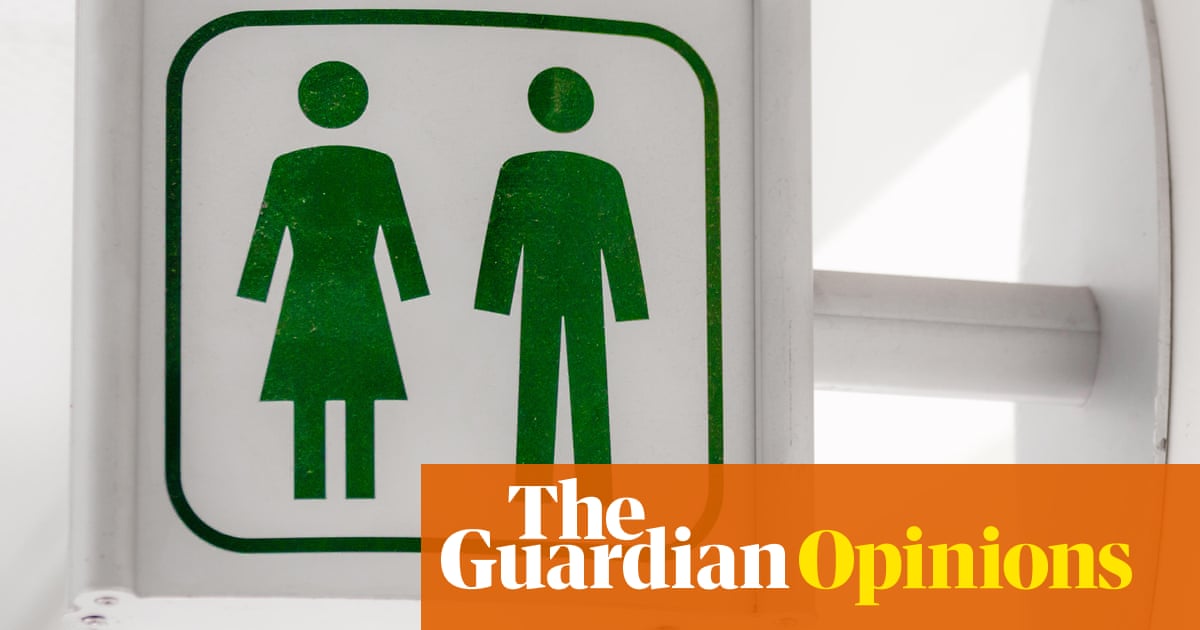Iwas visiting family in London when the British supreme court handed down itsunexpected ruling: under the Equality Act, sex was now considered “binary” in law, which meant transgender people could be banned from single-sex spaces of their gender identity. The Labour government, which had come into office promising us “dignity”, capitulated. But, not to worry, soothed a minister, Pat McFadden, “There isn’t going to be toilet police.”
A few days later the toilet police got me.
It was my last night in London before returning to Australia. I was in full makeup and a dress when my female friends took me out dancing at an alternative hub that has always prided itself on being an accepting space. And for an hour everything was great. We danced and drank and shouted incoherent enthusiasms to each other. But as the gin and tonics settled in my bladder, I felt my anxiety building. In 15 years of visiting Britain I have been presenting feminine in public without any problem, including using women’s bathrooms.
But now I needed to piss, and I was afraid.
Sensing my discomfort my friends loyally announced their own need to pee. So we filed through a maze of corridors until we got to the pair of doors that have bifurcated so much of my life.
And there she was. The literal toilet police. She was a stocky woman marking each visitor as they approached the door and, as we passed, she raised a finger of doom and pointed it at me. “NO,” she commanded, then rotated the finger towards the masculine pictogram. “Yougo there.”
We froze. I didn’t want to speak, ashamed of further betraying myself by my voice. Drunk and anxious as I was, the idea of going to that male bathroom, alone, was just impossible.
My friends came to the rescue, telling the guard to back off and escorting me into the women’s, which was crowded with people. Gaze fixed downwards to hide my humiliation, I pushed into a cubicle and peed. My head was ringing, there were raised voices outside, then the rap at the door.
“OUT!”
There was commotion, complete strangers were clamouring, I think, in my defence. The toilet policewoman ignored it all. I was obviously leaving anyway; there was nothing to be gained now but my humiliation.
I can’t remember if I was given a chance to wash my hands.
For a minute afterwards I stood crying against the wall. Then the toilet policewoman returned and took up position in front of me. She looked a little ashamed, and she touched a now-gentler hand to my arm.
“It’s not me,” she said. “It’s just the way things are now.”
“Just the way things are” means Britain has become a country where trans people can be yanked from their sports teams; where cash-strapped businesses can be forced to ghettoise their customers or potentially face legal action; and where cisgender women deemed insufficiently feminine fear abuse by self-appointed bathroom vigilantes.
Because that’s the thing about oppression: it widens. It affects us all.
I was born in the United Kingdom and consider it my second home. For years I have recognised its cultural pessimism and economic stagnation but I still loved it for its humour, its history and particularly for its cosmopolitan tolerance. It was as a young adult in London that I first felt fully able to embrace my gender. And while on this trip my Australian partner and I had been discussing immigrating to Britain, trying to picture what it would be like to make a life there.
Well, my experience made one thing clear. It would feel like stepping back 20 years in time, to a world that prickles against your skin in a hundred ways and where every outing is consumed by the need to “pass” as a survival strategy. Where it’s easier to be silent than to speak.
It’s not just Britain. In Trump’s America, transgender soldiersare being purged from the militaryand trans visitorsare cancelling travel to the USout of fear of discrimination. In April the Hungarian governmentpassed a constitutional amendmentbanning any assembling of queer people. Across the world it’s not just bathroom doors that are slamming shut for transgender people.
In this moment of global reaction, Australia has never felt so much like an island refuge. And I am deeply grateful for that. But I mourn the open-hearted country that I remember Britain being.
When a traveller lands at Heathrow airport, they are met by posters of beaming Britons, arms outstretched, above the words WELCOME! In the wake of this court ruling, the sentiment rings hollow.
I may not have been allowed to wash my hands. But the British state has made it clear that it has washed its hands of me.
Jack Nicholls is a British-Australian essayist and speculative-fiction writer based in Melbourne
